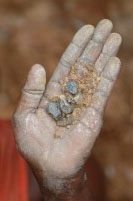
Janvier Murairi is president of Association pour le Developpement des Initiatives Paysanne(ASSODIP), and a leading Congolese human rights researcher and activist based in North Kivu, eastern Congo. ASSODIP, is one of 12 members of the local civil society coalition called the Support Platform for Traceability and Transparency in the Management of Natural Resources, or GATT-RN. Murairi and his team conduct their research in mining areas of North Kivu. In the context of recent public debate about conflict minerals, the impact of the Dodd-Frank legislation, and mining investments in the region, he was interviewed September 29, 2014 for Pragmora.com.
BACKGROUND
Bisie is a remote town in the Walikale district in eastern DR Congo. It has lucrative deposits of tin (cassiterite), along with coltan, diamond, uranium, cobalt, and bauxite deposits. Since its discovery in 2004, tin has been extracted through artisanal and small-scale mining. In 2006, the Mining and Processing Congo company (MPC) was granted exploration permits for the Bisie Mine with the expectation that a large-scale mining operation would follow. In August 2011, the Canadian company Alphamin acquired a majority interest in the Bisie Tin Mine and today is the sole owner.
Throughout most of the past decade, the Bisie mineral deposits have been under the physical control of various rebels groups and a renegade brigadeof the Congolese Army. Today, Alphamin awaits government permits to begin modern industrial mining of its Bisie Tin resources; however, conflicts with local artisanal miners have not yet been resolved.
EXCERPT:
Pragmora: There has been a lot of discussion about the Dodd-Frank conflict minerals legislation which is intended to ensure that American companies only buy minerals from the DR Congo that can be proven to be conflict-free at source and all along the supply chain to the end purchaser. Does the Dodd-Frank legislation affect artisanal miners in the Bisie area?
Janvier: This debate actually exists. There’s a shadow of a doubt that a link exists between natural resources and the conflict in the Kivu region. Several reports from civil society and even public authorities have come to this conclusion. Dodd-Frank emerged because it was necessary to cut the link between natural resources and the persistent conflict, even though the minerals are not the only resource that sustains the armed groups. If peace were to return, we would have to acknowledge that this law has greatly contributed to peace in the Kivus.
Several ideas have been floated on the fate of artisanal miners under the Dodd-Frank Act. It would seem it is the artisanal miners who have been most adversely affected by the law. At this point, I put a negative. How did they live before this law? I think it would be useful to conduct a socio-economic survey of the miners before and after the passage of Dodd-Frank before drawing conclusions that are biased.
Before this law, the diggers did not truly benefit from the fruits of their labor. Minerals have served people who were posing as diggers when they really were not. They used the diggers as steps or stairs. Before this law, how could true diggers improve their socio-economic status? Not many would have been able to build even a small house… hence the need for formalizing the artisanal mining sector by establishing genuine corporations and cooperatives that improves the conditions for those who go down into the holes, the ones who actually do the artisanal mining of minerals in Bisie.
Opponents of the [Dodd-Frank] law say the economy of the province and the country has suffered greatly from this legislation. I do not share that opinion. I know Walikale, North Kivu, before the law. No school infrastructure, road, or hospital was built during Bisie’s boom era. It is unacceptable to me to see that the exploitation of minerals in Bisie happened alongside crushing poverty in the country.
To conclude, I would say that the law is the work of humans, so it is perfectible. But we must recognize its merits, especially in terms of human rights.

